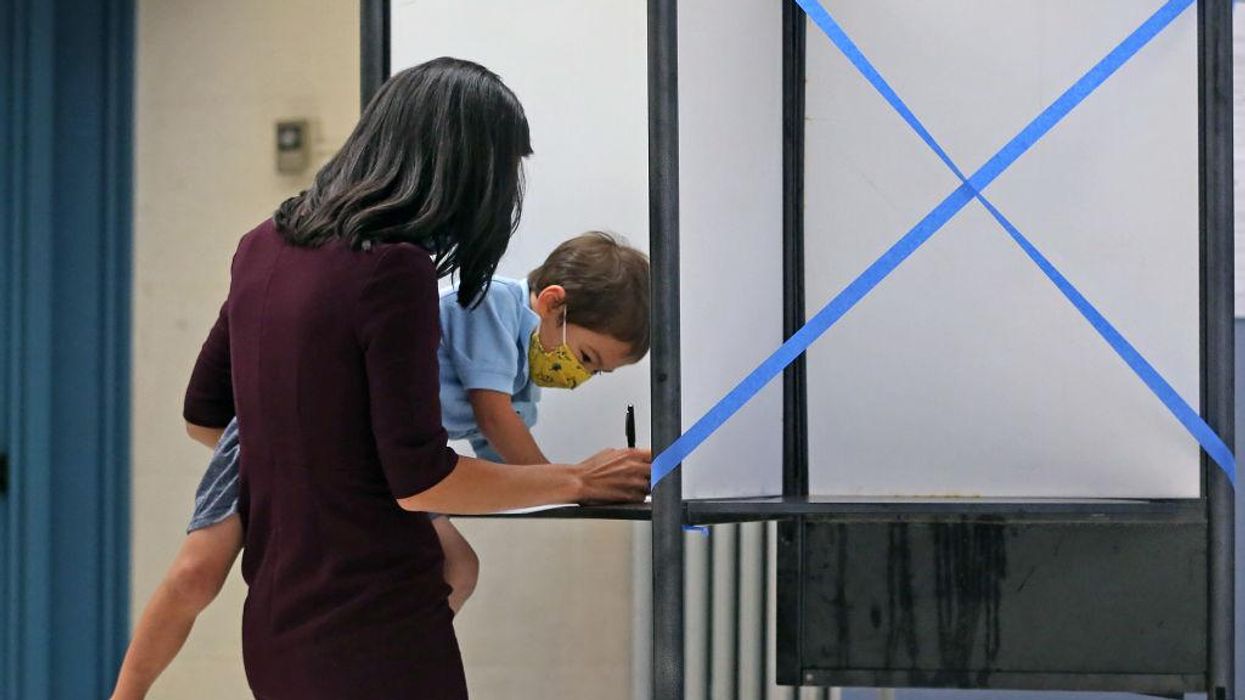
Photo by David L. Ryan/The Boston Globe via Getty Images

Democrats continue to seek new voting blocs amid their declining support from working-class voters. Extra to looking for ways to confer voting rights upon illegal aliens and foreign nationals, some Democrats are seeking ways to add high-schoolers to their ranks.
The Boston City Council approved a petition last week to allow juvenile residents to vote in municipal elections. Critics have suggested that the petition, which may still be killed at the state level, may be less about suffrage and more about potential partisan gains.
In a 9-4 vote with leftists composing the majority, the Boston City Council approved a petition on Nov. 30 that would allow 16- and 17-year-old residents to vote in municipal elections.
The petition was sent to Democrat Mayor Michelle Wu's desk for approval.
The Boston Globe reported that the proposed law would grant local — not federal or state — voting rights to teenage citizens without felony convictions.
In addition to getting to vote in local elections, 16- and 17-year-old registrants will also be pre-registered to vote in state and federal elections upon turning 18.
The measure will go to the Massachusetts legislature for approval, which is anything but guaranteed. Previous attempts to give juveniles the vote in the state have failed in the state House.
Councilor Julia Mejia, a co-sponsor of the petition, told WGBH that "young people are often the ones who are educating their parents and their peers and their family members about what is at stake when it comes to elections."
\u201cTeens in Boston are incredibly well-informed, and sometimes even educating the adults in their life, said @juliaforboston. She told @reillyadam on Talking Politics that they deserve the right to vote. https://t.co/oRpF3GuWN1\u201d— Greater Boston (@Greater Boston) 1670016991
Mejia also suggested that teens "are working — oftentimes two jobs — just to help support their families, paying taxes and on the front lines protesting and trying to find ways to have their voices heard. And every day we make decisions on their behalf."
She previously pointed to BLM as an example of what she regarded as positive politicking on the part of young people, illustrative of their ability to do more.
According to Mejia, teenagers not old enough to get into R-rated movies should not be denied a say on public policy.
According to Public School Review, public schools in Boston School District — full of the city's potential voters — have an average math proficiency score of 35% and reading proficiency score of 37%. The district's average testing ranking is 2/10.
Paul Craney, spokesman for the Massachusetts Fiscal Alliance, told the Boston Globe that lowering the voting age "just doesn't make sense."
"You're asking adults to weigh their ballot compared to children. ... Even if you have some children that are really mature for that age, everyone can acknowledge that 16-, 17-year-olds are still developing," said Craney.
Craney flipped the progressive rhetoric, suggesting that he is "all for getting them immersed in the democratic process," but as campaign volunteers rather than determiners of regional fate.
"I think there is a big, distinct difference [between that and] throwing ballots in front of them and asking them to make these decisions when they're minors," Craney added.
Hans von Spakovsky, former member of the Federal Election Commission and senior legal fellow in the Heritage Foundation's Meese Center for Legal and Judicial Studies, told Just the News, "This is a foolish, cynical move by Boston and other jurisdictions."
"Under the law, 16- and 17-year-olds are minors. They can't sign contracts or leases, buy alcohol, join the military, serve on a jury, or engage in a host of other activities that only legal adults are qualified to engage in because we as a society have judged that they have not yet developed the experience and judgment to make such decisions," said Spakovsky. "They aren't even treated as adults when they commit crimes, except under exceptional circumstances, for the very same reason."
City Councilor Erin Murphy voted in the minority against the measure, suggesting that kids are more easily influenced than adults and that involving them at a younger age may compromise their privacy, since registered voters' records become public.
"I worry that certain kids would be influenced into voting for a certain candidate instead of really coming up with their own opinion," Murphy told WBTS.
At a hearing in March, Murphy expounded on this concern, reported WGBH.
"I worry as a parent. I’ve lived through raising three teenagers. They have a lot to offer. I think they’re full of wisdom and have lots of ideas and thoughts, but I also think that they’re very impressionable," said Murphy.
Murphy also intimated that the ability to vote at this age may not be so much a concern of 16- and 17-year-olds but rather of those keen to reap their votes.
"I have never heard from any 16- or 17-year-old directly. ... I am hearing from voting rights advocates who are adults, but I'm never hearing directly from children who say they want it," she added.
The Deccan Herald reported that in the November 2022 election, youth voter turnout was huge, with 63% of the national youth vote choice for the U.S. House of Representatives going to Democrats.
Tufts' Center for Information and Research on Civic Leaning and Engagement recently broke down youth vote choice by sex and LGBT identification in the 2022 midterms: 71% of women and 53% of men ages 18-29 voted for a Democratic candidate.
Edison Research National Election Pool exit poll data showed that while youths were disproportionately inclined to vote Democrat, voters ages 30-44 were near-evenly split between Democrats and Republicans, and older voters favored Republicans.
It is therefore understandable why outgoing House Speaker Nancy Pelosi, Sen. Elizabeth Warren (Mass.), Rep. Nikema Williams (Ga.), and other federal Democrats have endeavored to find or introduce legal ways to register teenagers under the age of 18 to vote.